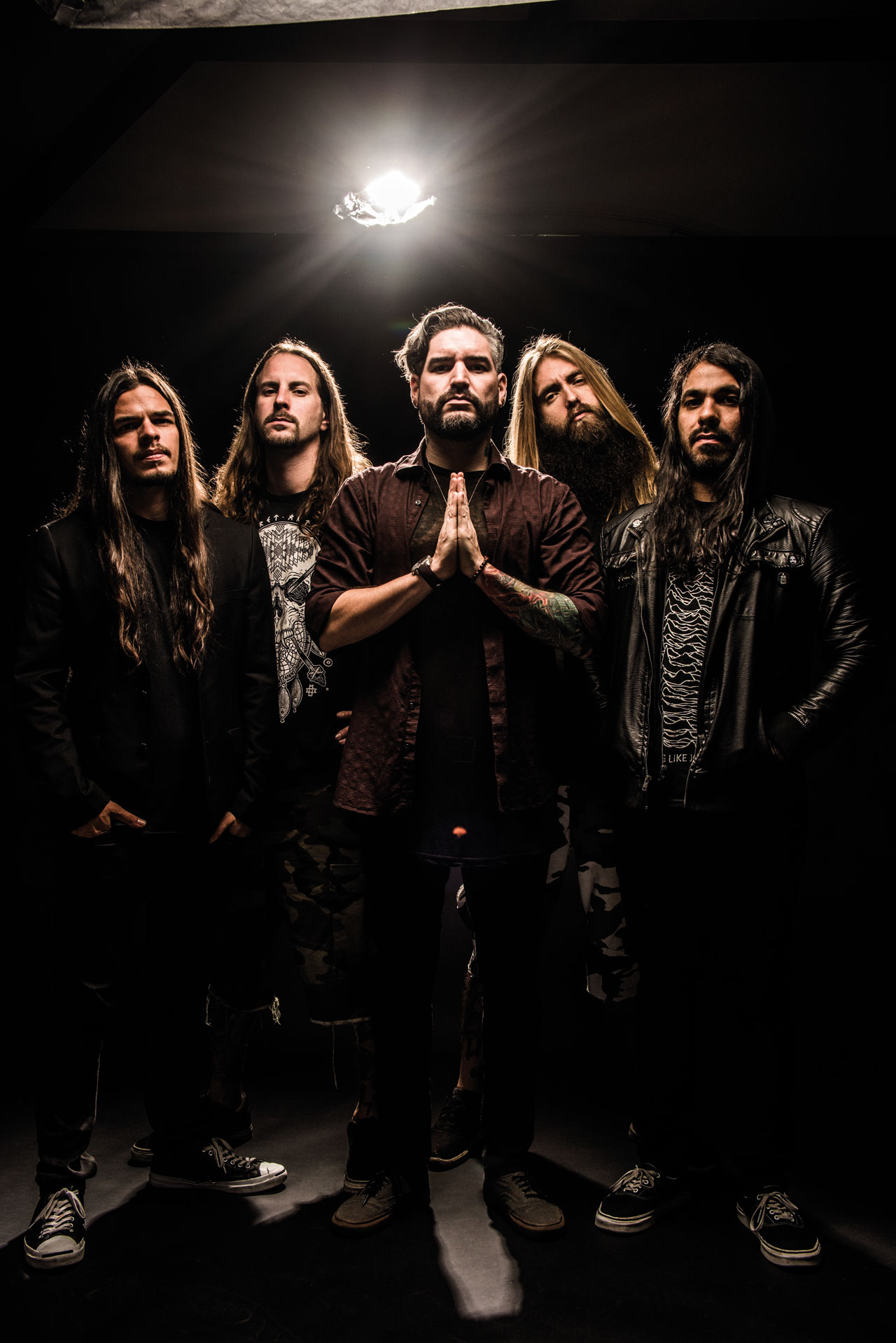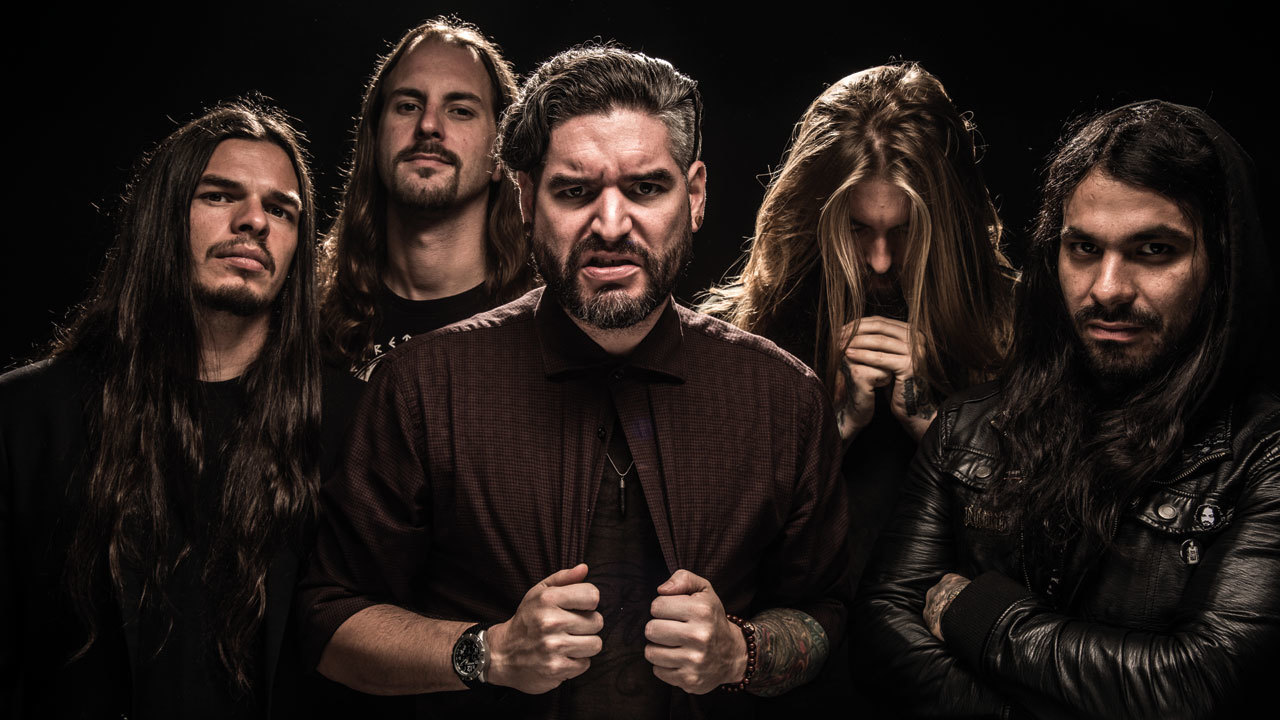Evolution is one thing. What Suicide Silence are about to drop on their not-insubstantial international fanbase is another thing entirely. Their new album, simply and boldly titled Suicide Silence, is nothing short of a wholesale resetting of the Californian crushers’ vision. It’s heavy and intense, of course, but it also sounds utterly different from everything Suicide Silence have released to date, right down to frontman Eddie Hermida’s sudden conversion to the ways of clean singing.
The initial response to the release of first single Doris was certainly more bad than good, and it doesn’t take a clairvoyant to predict that a lot of people are going to be quite… rude about Suicide Silence when it emerges on February 24. As a result, Hammer’s chat with Eddie could potentially be a bit awkward. Fortunately, he is both fully prepared for the backlash that will surely follow the album’s release and happy to explain where this unexpected and severe change of direction came from.
“I think the reason for the change grew from 10 years ago,” Eddie explains over Skype. “Being part of deathcore becoming a scene and a genre, with the gimmicks and the look, all of that closes you off creatively. The guys in Suicide Silence already knew that before making their second record together. I remember, back then, I asked Mitch [Lucker, former Suicide Silence vocalist who died in 2012], ‘What are you gonna do next?’ He said, ‘We are going to explore it all. If I have to sing clean, I’ll do it! I’m taking lessons and I don’t care!’ Meanwhile, I was in All Shall Perish and we weren’t playing that contrived deathcore sound either. So with that in all of our bones already, the next step this time was looking everybody in the eye and asking, ‘Are you ready to jump off this cliff?’”
In the end, they jumped. Everything from the raw, gnarly production, courtesy of the legendary Ross Robinson, to the complete absence of anything resembling a familiar deathcore trope combines to indicate that Suicide Silence have either completely lost the plot or made a rather extreme and defiant stand against the clichés they helped to create. Bits of it sound like Deftones on a really bad trip. Other parts sound as shambolic and hostile as any lo-fi black metal record. None of it sounds much like Suicide Silence. It is, if nothing else, a very brave move and one apparently motivated by a genuine desire to shake things up.
“The scene we’re playing to, dude, it’s very small and contrived and it’s a very scared scene,” says Eddie. “The fact is, no one is going to be talking about the last 15 years of music, because it didn’t achieve shit. I’ll tell you what people will be talking about, and that’s this record. I’ve recorded with my favourite producer and I’ve finally got a band who were willing to jump off the deepest of deep ends and play something unsafe, so I can write some unsafe shit, too.”
Ross Robinson’s involvement in the creation of Suicide Silence certainly goes some way towards explaining the radical nature of this next chapter in the band’s story. Famed for his unique approach to drawing the most honest and liberated performances possible out of everyone from Slipknot to The Cure, he was never going to be interested in letting Suicide Silence fall back on their usual sound. Instead, he encouraged Eddie and his bandmates to completely dismantle their music and rebuild it from the ground up with no fear. Eddie’s startling vocal performance, in particular, was very much influenced by Ross’s emotional guerrilla tactics.
“Dude, it was fucking horrendous, ha ha!” Eddie grins. “Ross challenges you, right down to how you snore at night! He makes you question your entire existence. It was two months of soul searching. If you’ve never done that before, I don’t recommend it. It’s the most painful thing you’ll ever go through. You’re challenged to meet your demons and meet the things that scare the fuck out of you. But what comes out of that is the most beautiful thing on Earth, and that’s the acceptance of love, and out of that comes the ability to be what you’ve always wanted to be, which is a servant to music.”

Whether you think the new album is a triumph or a calamity, it certainly isn’t designed to turn Suicide Silence into megastars. In fact, it’s arguably the least commercial thing they’ve ever done: an ugly, chaotic and sometimes sloppy record that frequently feels like one sustained, collective howl of pain. Having honoured Mitch Lucker’s passing on last album You Can’t Stop Me, Eddie states that writing the new album felt like his first true collaboration with the band and that, with a little help from Ross, he found the process of making the album to be “a huge therapeutic experience”.
“Most of the record has to do with my childhood,” he explains. “Most of it has to do with becoming a man and realising that all the pain and hatred I was harbouring for people really came out of love. I was afraid to love the people who caused me pain. This record has a lot of forgiveness in it. Not forgiving the people who caused me pain, but forgiving myself for being hateful towards them. It’s me looking at that monster and saying, ‘Hey dude, you’re a part of me, I’m blessed to have you and this is the music that’s gonna come out now!’”
It’s not just the fans that will have to get used to the new sound of Suicide Silence. According to Eddie, the band’s label bosses at Nuclear Blast were not at all impressed with initial demos for the album, even delaying the payment of Ross Robinson’s deposit just before the band were due to hit the studio. After writing a couple of heavier, slightly less off-piste tunes to reassure the label, normal service was resumed and the album was finally completed and sent to the powers-that-be for approval.
“The first thing that Monte Conner [Nuclear Blast A&R supremo] said to us was, ‘Absolutely not! You cannot jump from A to D. You need to do B and C first. Let’s plan for 10 years ahead!’” Eddie laughs. “But the fact is, we don’t have time to sit and fuckin’ dilly-daddle. In the end I had a straightup phone conversation with [label founder] Markus Staiger, and he said, ‘Eddie, do you believe in this art?’ There was no pause. I just said, ‘Markus, I believe in this with all of my heart.’ As soon as he heard me say that, a switch turned and they immediately backed everything we’re doing. But it didn’t go down without a fight, man, ha ha!”
Despite jettisoning their trademark sound, Eddie Hermida and Suicide Silence are plainly 100% certain that they are heading in the only direction that makes sense for them. For that alone, we should applaud them. Whether or not the new album will win people over in the same way remains to be seen, but at least Suicide Silence aren’t scared to rock the boat. Let’s just hope they know where the lifejackets are kept. “
A lot of people have been saying that after five or six listens, they really start to get the message and can hear where we’re coming from,” Eddie notes in conclusion. “But you know what? It’s not meant for everybody. It’s meant to challenge people. It’s our way of saying, ‘Who’s next?’ and ‘What’s up? All you suckers before and after us? You’re all dead in the water and you don’t even know it.’”
SUICIDE SILENCE IS OUT ON FEBRUARY 24 VIA NUCLEAR BLAST. THE BAND TOUR THE UK NEXT MONTH
Suicide Silence laugh off criticism of new material
Suicide Silence's new album is a 'statement'
Suicide Silence ‘fans’ launch petition to stop album release

